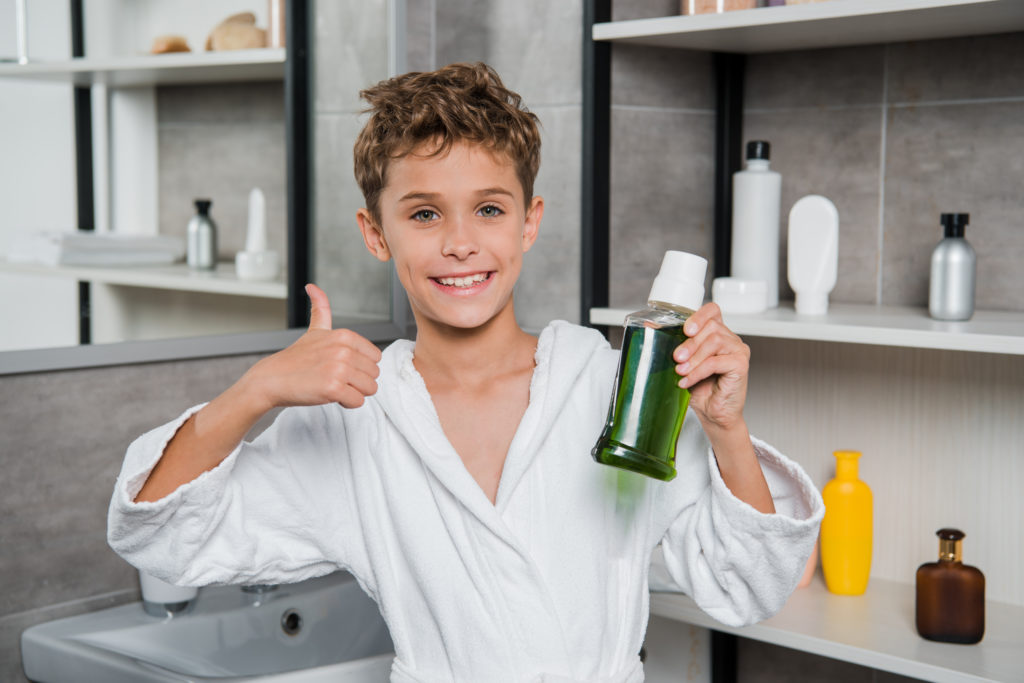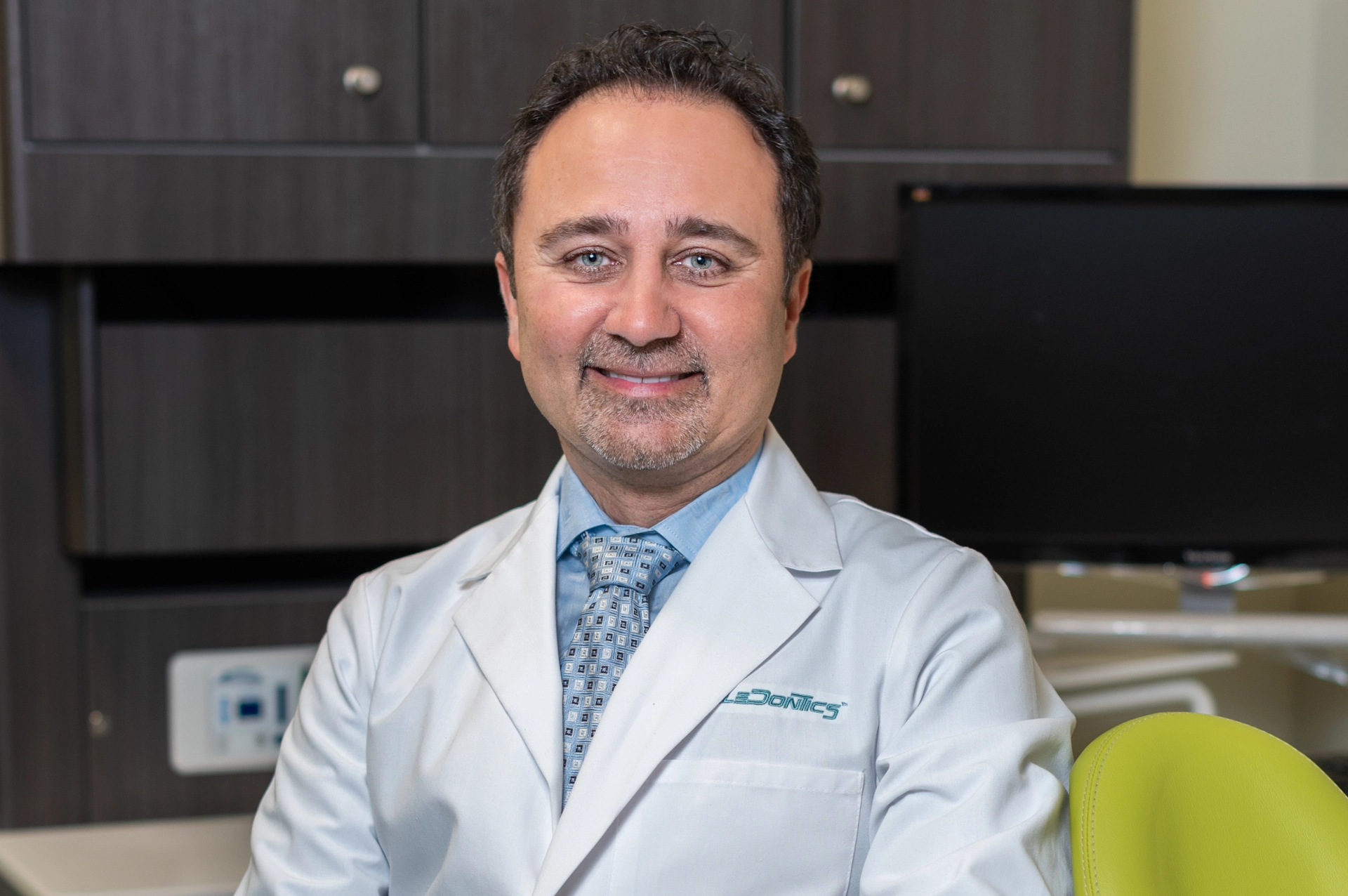
Many adults frequently use mouthwash to freshen their breath, rinse out food debris, and add an additional fluoride source. Kids’ mouthwash, however, is a more sensitive subject. Do kids need mouthwash and is it safe for them to use it?
Is fluoride bad for toddlers and young children? What about older children? When it comes to mouthwash and kids, you might discover you have more questions than answers. Let’s take a closer look at when kids’ mouthwash might be appropriate and when it’s best to skip it.
Can Kids Use Mouthwash?
The first question most parents have about mouthwash for kids is whether it’s safe to use. The answer depends on your child’s age and on their ability to spit properly. It also depends on the type of mouthwash you’re considering.
Some ingredients in certain mouthwash formulations could be harmful to your child if used prematurely or if they are swallowed. Some parents also wonder: can kids use adult mouthwash or can adults use children’s mouthwash? That depends on a number of different factors.
At What Age Can Children Use Mouthwash?
Of the many things to consider when deciding whether your child can safely use mouthwash, the first is your child’s age.
For kids under the age of 6, mouthwash is not recommended. This is primarily because younger children are not very good at rinsing without swallowing, so there is a higher risk that they could swallow the mouthwash.
As a result, depending on the mouthwash, this could cause nausea, an upset stomach, vomiting, or even intoxication if the mouthwash contains alcohol.
Additionally, children under the age of eight can develop a condition called fluorosis if they use too much fluoride. This condition leads to white streaks and spots on the enamel of teeth that have not yet erupted.
This might leave you wondering, “Is fluoride bad for toddlers and young children?” While some fluoride is fine when used correctly, the risk of a young child getting too much fluoride is a legitimate concern.
After age 8, it’s okay for your kids to use a fluoride mouthwash made for children as long as they are capable of spitting it out properly without swallowing any. In any case, it’s a good idea for an adult to monitor children’s use of mouthwash until about age 12 to ensure they use it correctly.
Is There Mouthwash For Toddlers?
There are mouthwashes that are specifically formulated for children, including toddlers. These mouthwashes are usually alcohol-free and have a milder flavor than those made for adults. They may also contain ingredients that are gentle and safe for young children.
It’s important to note that mouthwash should not be used as a substitute for brushing and flossing, which are crucial for maintaining good oral hygiene.
How to Handle Bad Breath in Children?
If your child has bad breath, don’t immediately reach for mouthwash even if it’s mouthwash safe for kids.
Here are some things you can do to help:
Encourage regular brushing and flossing: Good oral hygiene is key to preventing bad breath. Encourage your child to brush their teeth at least twice a day and floss once a day.
Use a tongue cleaner: The tongue can be a source of the many microbes that cause bad breath. Toothbrush bristles are really not designed to clean the tongue properly so use a tongue brush or scraper to clean the tongue every time your brush your teeth as well.
Promote hydration: Make sure your child is drinking enough water throughout the day. Staying hydrated can help prevent dry mouth, which can contribute to bad breath.
Limit sugary and starchy foods: Sugary and starchy foods can increase the growth of bacteria in the mouth, leading to bad breath. Encourage your child to eat a healthy diet with plenty of fruits, vegetables, and whole grains.
Schedule regular dental checkups: Regular dental checkups can help identify and treat any underlying dental problems that may be contributing to bad breath.
Why Does the ADA Recommend Children Not Use Mouthwash?
The American Dental Association, or ADA, does not recommend mouthwash for children under the age of 6 because of the risk of swallowing the mouthwash.
The adverse effects of swallowing mouthwash (noted earlier) can be significant for younger children, so it’s important to avoid it until recommended by your dentist.
If your dentist does recommend a mouthwash for your child, pay close attention to directions and warnings on the label of the mouthwash.
Only in rare cases will a dentist recommend antibacterial mouthwash for toddlers and young children, so it’s essential that they be used correctly. Follow recommended precautions and age recommendations for all children’s mouthwash, and read the directions carefully.
Make sure your child follows the instructions properly every time they use any kids’ mouthwash.
What Types of Mouthwash Are Recommended for Children?
There are many different types of mouthwash for children on the market, but some of them are just marketing ploys with unnecessary ingredients or flavorings added.
As evidenced by the uptick in the popularity of charcoal toothpaste, there can be fads in oral care with no actual benefit to oral health. Still, there can be some benefits to using mouthwash for older kids. So how do you know what type of mouthwash to choose for your child?
When choosing a mouthwash for your child, it’s important to look closely at the ingredients in the kids’ mouthwash. First talk to your child’s dentist for recommendations.
Ideally, any mouthwash you choose for your child will be alcohol-free (especially for kids 12 and under), but it may or may not need to include fluoride depending on your goals for this mouthwash.
Some parents wonder, “Can kids use Listerine or similar adult mouthwash?” As noted, it’s best to opt for a children’s version of any mouthwash to ensure that they do not contain alcohol or an inappropriate fluoride strength.
It’s clear that kids shouldn’t use adult mouthwash, both because of potential alcohol content and higher fluoride concentration. However, parents may also be curious if adults can use children’s mouthwash. Ultimately, children’s mouthwash isn’t going to harm a grownup.
However, kids and adults should have different mouthwash formulations because adults and children have different oral hygiene needs.
For instance, adults may need more fluoride in their mouthwash than children’s formulations offer, and kids’ formulas often come in flavors, like bubblegum or strawberry, that are less appealing to adults. When in doubt, always ask your dentist what mouthwash will work best for you.
What Ingredients in Mouthwash are Bad for Kids?
There are certain ingredients in mouthwash that may be harmful to children, especially if they accidentally swallow it.
- Alcohol: This is the most common ingredient in mouthwash and it’s harmful if swallowed by kids. Alcohol-free mouthwash is available for children.
- Hydrogen Peroxide: Hydrogen peroxide is effective at treating bad breath but it can irritate your child’s mouth if they swallow the mouthwash.
- Artificial ingredients: Artificial colors, flavors, sugars or preservatives don’t belong in our bodies and they especially don’t belong in our children’s bodies.
- Antimicrobial ingredients: antibiotics and antimicrobial ingredients may be fine for acute infections but should not be used in oral care since they indiscriminately kill the microbes that make up the oral microbiome.
What ingredients in Mouthwash are Good for Kids?
- Fluoride: While fluoride is a common ingredient in toothpaste and can be beneficial for preventing tooth decay, excessive fluoride intake can be harmful to children’s developing teeth.
- Hydroxyapatite (nano-hydroxyapatite): A safe and alternative ingredient for parents who prefer a fluoride-free option is hydroxyapatite. Hydroxyapatite is a calcium phosphate mineral that is naturally found in your teeth. In fact 97% of enamel and 70% of dentin is made of hydroxyapatite.
- Prebiotics: Prebiotics such as inulin and xylitol feed the good microbes while selectively reducing the harmful ones. Inulin also reduces the bacteria that cause bad breath.
- Alkaline pH: Look for mouthwashes that are alkaline and not acidic. Harmful microbes thrive in pH below 5.5 so make sure your children’s mouthwash have an alkaline pH over 7.
Let Your Dentist Help Your Family Maintain Healthy Mouths
The best way to determine whether your child is ready for mouthwash is to talk to their dentist. If your child is over the age of 6, able to brush independently, and can swish and spit out toothpaste or water effectively, they may be ready. However, that still doesn’t always mean your child needs mouthwash.
Brushing teeth twice per day, flossing daily, and seeing your dentist regularly are the most important pieces of the puzzle. If you feel like your child could use a little extra oral care after that, touch base with your child’s dentist to see if they have recommendations.
If you want to learn more about how to keep your child’s mouth healthy, and how poor oral care can impact overall health, preorder If Your Mouth Could Talk by dentist, dad, and oral health expert Dr. Kami Hoss.
Discover how maintaining excellent oral hygiene, including using mouthwash at the correct time and in the correct way, is key to the health of your whole body.

